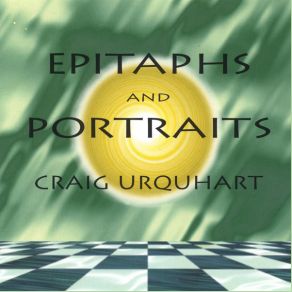Epitaphs and Portraits
Download links and information about Epitaphs and Portraits by Craig Urquhart. This album was released in 1994 and it belongs to New Age genres. It contains 14 tracks with total duration of 57:27 minutes.

|
|
|---|---|
| Artist: | Craig Urquhart |
| Release date: | 1994 |
| Genre: | New Age |
| Tracks: | 14 |
| Duration: | 57:27 |
| Buy it NOW at: | |
| Buy on iTunes $9.99 | |
| Buy on Amazon $8.99 | |
Tracks
[Edit]| No. | Title | Length |
|---|---|---|
| 1. | Honor & Remembrance | 7:02 |
| 2. | In Memoriam G.S. | 5:55 |
| 3. | In Memoriam J. S. | 5:54 |
| 4. | In Memoriam L. L. | 5:28 |
| 5. | In Memoriam E. G. | 1:47 |
| 6. | In Memoriam J. R. | 4:33 |
| 7. | In Memoriam S.G. | 3:27 |
| 8. | In Memoriam M. M. | 3:30 |
| 9. | In Memoriam R. C. | 2:28 |
| 10. | In Memoriam L.S. | 2:37 |
| 11. | Charlie's Blues | 2:16 |
| 12. | In Memoriam | 4:35 |
| 13. | Bread & Roses | 3:48 |
| 14. | Berceuse | 4:07 |
Details
[Edit]Classically trained pianist Craig Urquhart has had the magnificent fortune in his life to work as an assistant to the man whom he credits with inspiring his entire musical career, the great Leonard Bernstein. Bernstein said of Urquhart, "...he's a truly gifted composer (whose music has) a deceptive simplicity and honesty that is rarely to be heard. His tonal approach is not merely sincere, but genuinely moving, with a private beauty of its own." Over the years, his classical compositions have been recorded by world-famous baritone Thomas Hampson and Lauren Wagner. His "The Wonder of Miracles" was choreographed by the Turtle's Dance Company for a memorial concert at the Cathedral St. John the Divine. His compositional style began shifting from classical to new age as he began appreciating the later compositions of Brian Eno and Philip Glass, and his approach moved from atonal to tonal and lyrical after a project which found him setting the poetry of Walt Whitman and Emily Dickinson to music. This 14-track recording pays loving tribute to friends, acquaintances, and caretakers of people who died of AIDS. "It is not melancholy in tone," he says, "but rather celebratory of these people and their lives. These songs were my way of dealing with the mounting losses. Some of them reflect the personalities of the departed, others the emotions of their caretakers." Another, "In Memoriam G.S.," is an angry piece. The set begins with "Honor and Remembrance" before moving into a series of nine individual tracks with titles indicating "in memoriam" and the departed person's initials. Others include "Charlie's Blues," "Bread and Roses" (named for an AIDS hospice in Connecticut), and the lullaby "Berceuse." The idea for this recording is based on Urquhart's belief that music can heal, and the musical harmonies represent the harmony listeners can have in their lives.